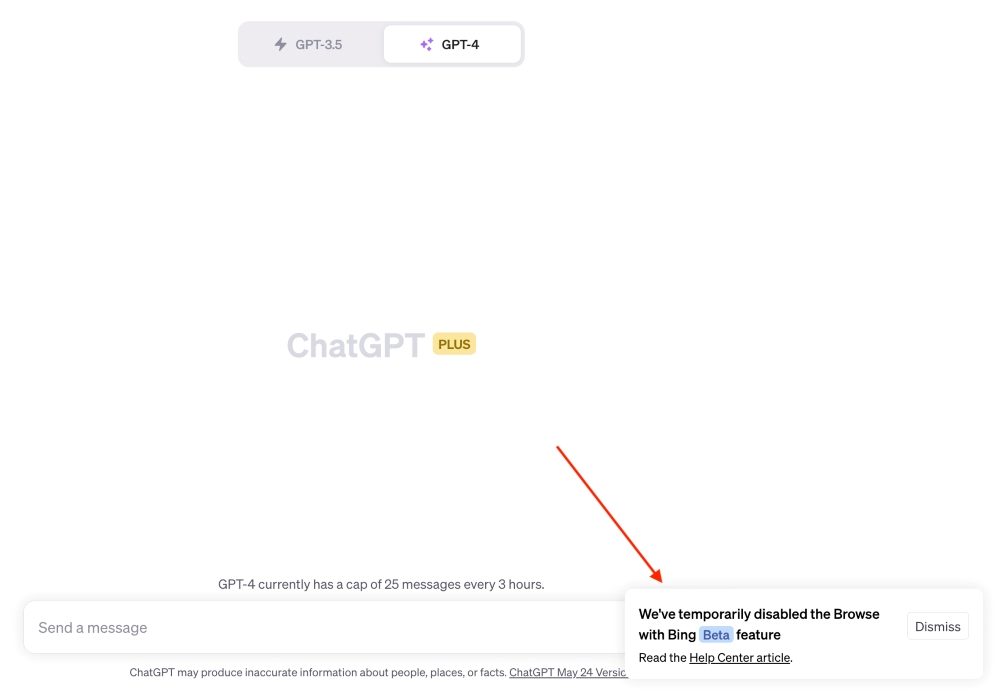The Gist
- No more Bing plugin for you. The "Browse with Bing" beta plugin for ChatGPT-4 was disabled on July 3 due to concerns about it displaying content in inappropriate ways.
- Internet meets AI. This change has caused significant attention as ChatGPT, the fastest-growing app of all time, benefits from internet-based sources for producing well-documented, reliable content.
- Bing will be back. Despite the current issue, OpenAI is committed to improving the feature and will bring it back soon.
The creators of ChatGPT disabled the generative AI chatbot's web browser plugin that connects user queries to the Microsoft Bing search engine July 3 because it displays content "in ways we don't want."
ChatGPT users over the July 4 holiday weekend who expected to use the "Browse with Bing" beta plugin were likely surprised when the plugin for ChatGPT-4, the chatbot's paid plus-version, disappeared from the usual drop-down screen. A pop-up on the lower righthand side of the ChatGPT-4 home screen said, "We've temporarily disabled the Browse with Bing Beta feature" and linked to a no-longer available Help Center article that offered an explanation.
"ChatGPT Browse with Bing is a beta feature (available to ChatGPT Plus subscribers) that allows ChatGPT to search the internet to help answer questions that benefit from recent information," OpenAI's Michael Schade wrote in the help center article. "We have learned that the ChatGPT Browse beta can occasionally display content in ways we don't want. For example, if a user specifically asks for a URL's full text, it might inadvertently fulfill this request. As of July 3, 2023, we’ve disabled the Browse with Bing beta feature out of an abundance of caution while we fix this in order to do right by content owners. We are working to bring the beta back as quickly as possible, and appreciate your understanding!"
Of course, not all were totally understanding in the Land of Twitter:
> Raise 11.7 Billion
— Jeff Kirdeikis (@JeffKirdeikis) July 4, 2023
> Oops! We didn't know our program that browses the web could read websites! We're taking that feature away now after weeks in prod, our mistake!
Great testing department🤡
OpenSource will eat OpenAI's lunch
ChatGPT's Connection to the Internet
Normally, a disabled plugin may not make headline news. Not the case with ChatGPT, the fastest-growing app of all-time. And certainly not when it comes to its Bing web browser plug-in.
You see, as much as these revolutionary generative AI-based chatbots can change the customer experience and marketing game, the content they produce without the backing of a legitimate internet-based source are just unsourced, unpredictable rubbish in the eyes of many.
Sure, ChatGPT can pass the bar, write term papers and do just about anything for our self-indulgent urges like orchestrate a rap battle between peanut butter and jelly within seconds. But in May, when ChatGPT introduced its Bing-powered Web-browsing plug-in, it became a marriage of internet and AI. Or, more accurately, where chatbot meets search, the latter method on which Google built an empire and the former operating arguably more impressively on large language models.
In short, search and chatbots is an extremely powerful combination for finding answers — answers that are well-documented and well-sourced. So, yes, when it goes down, it's big news.

Related Article: OpenAI Incorporates Web Search Into ChatGPT With Web Browser Plugin
What's Ahead for Bing Web Browser on ChatGPT?
What's next for the ChatGPT web browser plugin? We're not sure and will be following OpenAI's reports on the plugin.
Customer experience and marketing professionals should remember this is an experimental model, hosted by OpenAI itself, and connects ChatGPT with the wonderful world of the Web via the Bing search API. That means its future, even without the Fourth of July weekend shutdown, is uncertain. That's the nature of beta applications.
When it debuted in May, OpenAI planned to gradually enable existing plugins from its early collaborators for ChatGPT users, beginning with ChatGPT Plus subscribers.
"In the coming months, as we learn from deployment and continue to improve our safety systems, we’ll iterate on this protocol, and we plan to enable developers using OpenAI models to integrate plugins into their own applications beyond ChatGPT," OpenAI officials wrote back in May.
OpenAI added in a tweet on July 3, "Very grateful to the ChatGPT Plus subscribers who have been helping us test the browsing feature. This is why we started with a beta — have received extremely valuable feedback, learned a lot, & will bring it back soon."
